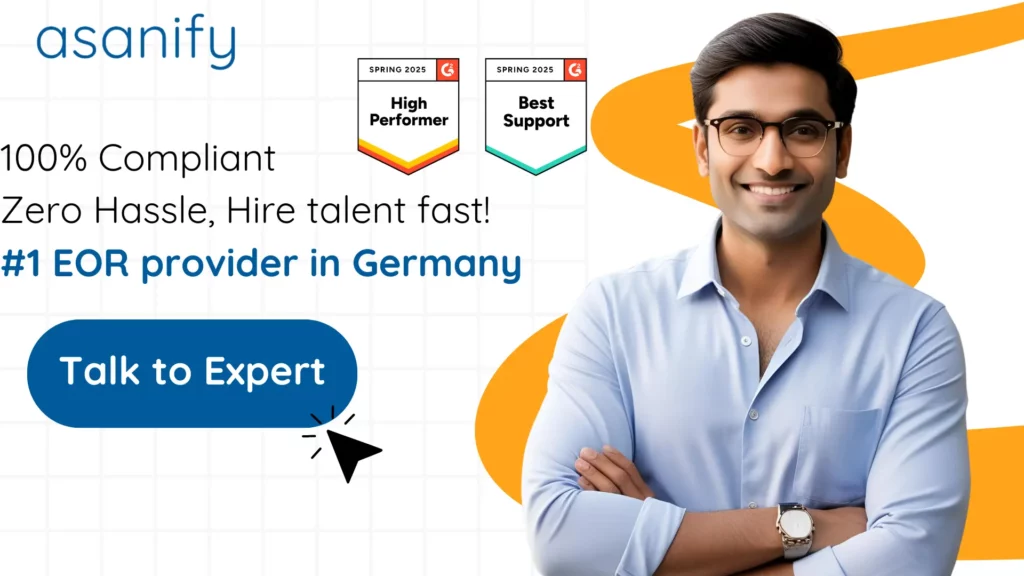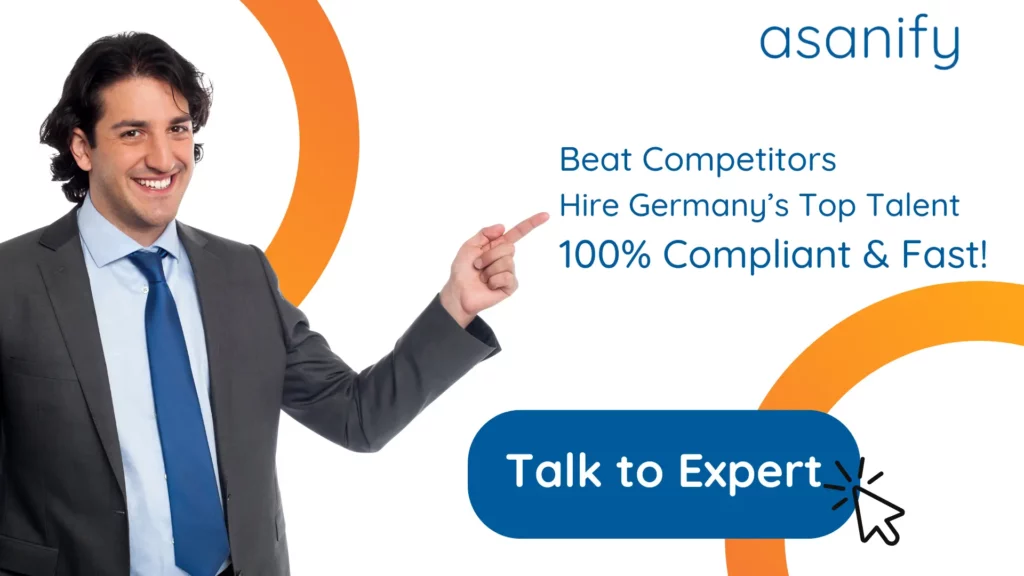Expanding your business into Germany provides access to Europe’s largest economy and a global leader in technology, manufacturing, and innovation. However, before hiring in Germany, employers must understand the country’s work authorization process. Securing the correct work permit and visa in Germany for non-German employees is crucial to remaining compliant with immigration laws and ensuring a seamless hiring experience.
Navigating these requirements can be challenging, as they depend on factors such as the employee’s nationality, occupation, and intended length of stay. Employers must ensure that all documentation is accurately completed and submitted within the specified deadlines. Partnering with specialists or an Employer of Record (EOR) can help simplify the process, minimize administrative burdens, and reduce the risk of compliance issues.
Table of Contents
- Overview of Germany’s Work Permit and Visa System
- Understanding Requirements and Eligibility
- Types of Work Visas and Permits in Germany
- Advantages of the EU Blue Card
- Application Process for Employers
- Processing Timelines
- Employer Responsibilities and Compliance
- Tips for a Smooth Application Process
- How an Employer of Record Can Help
- How Asanify Can Help
- FAQs
Overview of Germany’s Work Permit and Visa System
Germany has a structured framework for regulating foreign employment, with rules varying depending on nationality, skill level, and duration of stay. While EU/EEA and Swiss citizens benefit from free movement rights, non-EU nationals must undergo a formal application process before starting work.
- EU/EEA/Swiss citizens – No work permit required under EU freedom of movement.
- Non-EU nationals – Must obtain a residence permit with work authorization before employment.
- Federal administration – Germany’s Federal Employment Agency and local Foreigners’ Authority coordinate approvals.
- Employer-driven process – Employers often initiate the work authorization application before the employee applies for a visa.
- Two-step system – Obtain work authorization, then secure a long-term residence visa (if applying from abroad).
Understanding Requirements and Eligibility
Before starting the process, employers and employees must know Germany’s work permit rules. In general, non-EU nationals need a residence permit for employment purposes. Requirements depend on factors such as the worker’s nationality, occupation, and qualifications.
Who Needs a Work Permit in Germany
Most non-EEA and non-Swiss nationals require a work permit tied to their residence status. EU/EEA and Swiss nationals are exempt from work authorization under free movement rights. Employers hiring non-EU citizens must ensure proper authorization before the employee starts working.
Key Conditions for Obtaining a Work Visa
Foreign nationals applying for a German work visa typically must:
- Have a confirmed job offer from a German employer.
- Show proof of relevant qualifications or professional experience.
- Provide evidence of sufficient health insurance coverage.
- Maintain a clean criminal record.
Employer and Employee Eligibility
For certain permit types—especially for non-shortage occupations—employers may need to prove that no suitable candidate from Germany or the EU is available. Employees must meet qualification and salary thresholds, which vary depending on the visa type.

Types of Work Visas and Permits in Germany
Germany offers multiple pathways for foreign nationals to gain work authorization, depending on skill level, qualifications, and duration of employment:
- General Employment Visa – For skilled workers with recognized qualifications.
- EU Blue Card – For highly qualified workers meeting salary and education thresholds, with faster processing and EU mobility benefits.
- Job Seeker Visa – Allows entry to search for employment; not for immediate work.
- ICT Card (Intra-Corporate Transfer) – For managers and specialists transferred within a multinational group.
- Residence Permit for Employment – Combines residence and work rights in one process.
Suggested Read: A Detailed Guide on Employer Of Record Germany 2025
Comparing Work Permit Types
| Permit Type | Purpose | Duration | Notes |
| General Employment Visa | Skilled work in Germany | Up to 4 years | Requires qualifications recognition |
| EU Blue Card | Highly skilled professionals | Up to 4 years | Salary threshold applies, faster processing |
| Job Seeker Visa | Search for work in Germany | Up to 6 months | No work allowed until job offer is secured |
| ICT Card | Intra-company transfers | 1–3 years | For managers and specialists |
| Residence Permit for Work | Employment + residence | 1–4 years | Streamlined compliance |
Advantages of the EU Blue Card
The EU Blue Card offers benefits such as faster application processing, the ability to change employers after two years, and simplified family reunification. Holders can also move more easily to other EU countries after meeting residency requirements. In addition, it provides a clear pathway to permanent residency in Germany after a shorter qualifying period and ensures recognition of professional qualifications across multiple EU member states.
Key Benefits of the EU Blue Card:
- Quicker and more efficient application process compared to standard permits.
- Freedom to change employers after two years without reapplying.
- Facilitated family reunification with the right for family members to work.
- Mobility to live and work in other EU member states after set residency requirements.
- Eligibility for permanent residency in Germany after 33 months (or 21 months with sufficient language proficiency).
- Recognition of professional qualifications within the EU, supporting career mobility.
Application Process for Employers
The process usually starts after an employer offers a job to a foreign candidate. The employer submits required details to the Federal Employment Agency for approval. Once the agency confirms eligibility, the candidate applies for a long-term visa (if outside Germany) at the German embassy or consulate. Upon arrival, the employee registers with the local Foreigners’ Authority to receive their residence permit.
Required Documents
Typical applications require:
- Signed employment contract.
- Copy of the employee’s passport.
- Proof of qualifications and recognition (if applicable).
- Federal Employment Agency approval (for certain roles).
- Health insurance confirmation.
Official portals, such as Make it in Germany and the Federal Office for Migration and Refugees (BAMF), provide updated document checklists.

Processing Timelines
Work permit processing in Germany generally takes 6–12 weeks, depending on the type of permit, the applicant’s qualifications, and the accuracy of the submitted documentation. EU Blue Card applications and residence permits for shortage occupations often have faster processing compared to general employment visas.
Processing timelines may vary based on the applicant’s nationality, the complexity of the case, and the workload of the relevant authorities.
- Incomplete or incorrect applications can lead to significant delays or rejections.
- Occupation-specific permits (e.g., in engineering, IT, or healthcare) may have unique requirements and review procedures.
- Coordination between the employer, Federal Employment Agency, and local Foreigners’ Authority is essential to avoid administrative backlogs.
- Using an EOR or immigration consultant can help streamline the process, ensure documentation accuracy, and improve approval speed.
Employer Responsibilities and Compliance
German labor laws impose strict compliance obligations on employers hiring foreign nationals. This includes:
- Offering contracts that meet German labor standards.
- Paying salaries at or above the legal thresholds.
- Keeping accurate records of employment status.
- Renewing permits before expiration.
Consequences of Non-Compliance
- Heavy fines.
- Possible legal prosecution.
- Restrictions on hiring foreign staff in the future.
Maintaining Ongoing Compliance
- Track permit expiry dates.
- Conduct internal audits.
- Keep HR staff updated on immigration law changes.
Tips for a Smooth Application Process
- Start applications early to account for embassy and agency processing times.
- Double-check documents to avoid rejection.
- Be aware of occupation-specific requirements, especially for regulated professions.
- Consider working with an Employer of Record (EOR) for simplified hiring.

How an Employer of Record Can Help
An Employer of Record in Germany enables companies to hire foreign talent without setting up a German entity. The EOR serves as the legal employer, managing payroll, benefits, compliance, and immigration requirements—allowing businesses to expand quickly while staying compliant. It also handles employment contracts in accordance with German labor laws, ensuring accurate tax and social security contributions. By taking over all HR administration, the EOR frees companies to focus on growth and operations rather than navigating complex regulations. Additionally, an EOR provides ongoing legal updates, helping businesses adapt to changes in employment and immigration policies with minimal disruption.
Suggested Read: Understanding Labour Laws in Germany
How Asanify Can Help
Navigating Germany’s work authorization process can be challenging, especially for businesses hiring internationally. Asanify offers a comprehensive Employer of Record (EOR) solution that streamlines hiring and workforce management in Germany.
Our services cover every stage of the process—from securing the appropriate work permits to processing payroll, benefits, and compliance—ensuring you meet all German labor code requirements without establishing a local legal entity.
With Asanify, you can:
- Hire and onboard international talent quickly without administrative bottlenecks.
- Stay fully compliant with German employment regulations.
- Expand into Germany without the cost and complexity of setting up a company.
If your goal is to scale your team in Germany efficiently, Asanify’s expertise and end-to-end support make it easy to navigate regulations while focusing on your core business.
FAQs
Usually 1–4 years, with possible extensions.
Typically €75–€140, excluding legal or consultancy fees.
Yes, but they must hold a valid residence permit with work authorization.
A work and residence permit for highly skilled non-EU citizens meeting education and salary criteria.
Yes, it combines both in a single process.
Yes, particularly for the EU Blue Card and some skilled worker visas.
On average, 6–12 weeks.
Yes, under Germany’s family reunification provisions.
The employee must stop working immediately; renewal must be filed before expiry.
To manage compliance, payroll, and immigration seamlessly without establishing a local entity.
Not to be considered as tax, legal, financial or HR advice. Regulations change over time so please consult a lawyer, accountant or Labour Law expert for specific guidance.

